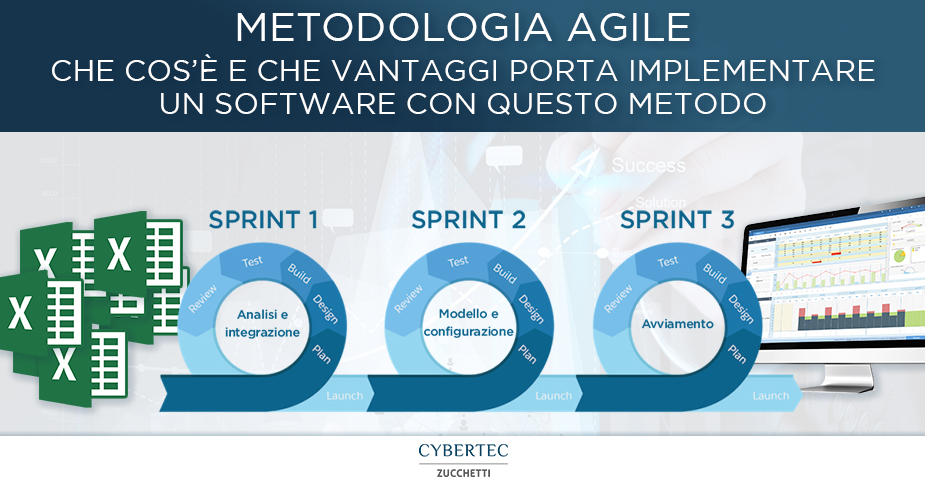The Agile methodology, originated from the software industry, has become increasingly rooted as a methodology for digitization projects in companies, especially in the implementation of new applications to support business processes. But what are the advantages that this methodology brings within complex projects such as the implementation of a management software or a department integrated with it?
Whatis the Agile method for implementing technologies?
Agile is a project management methodology that uses short development cycles called “sprints” to focus on continuous improvement in the development of a product or service.Although incremental development methods date back to 1957, Agile was discussed in depth in the 1970s by William Royce who published a paper on the development of large software systems. Since the 2000s, the benefits of sprints for continuous improvement have been brought to project management methodologies. The advantages of this methodologies applied to project management are important, especially when applied to projects implementing new technologies.
The Agile Manifesto
The word agile used in relation to software development was introduced with the Agile Manifesto, published in 2001 and born from the meeting of 17 American computer scientists, software engineers and programmers, who had met at a ski resort in the mountains of Utah to formalize principles on which to base agile methodologies.
The manifesto states the four values on which agile technology should be based, namely:
- Individuals and interactions rather than processes and tools;
- The working software rather than the exhaustive documentation;
- Collaboration with the customer rather than the negotiation of contracts;
- Responding to change more than following a plan.
Subsequently, to these were also added the 12 useful principles to follow to carry out the transaction of the teams in compliance with the agile culture, which above all aim at customer satisfaction by offering a quality product and teamwork.
The advantages of the Agile methodology
This project management methodology allows projects implementing new technologies to achieve a better result in less time. Short and iterative sessions (also called sprints) allow the supplier and customer to work together in search of the maximum result and to import changes or adjustments at each step.
The main benefits appreciated by those who use this methodology are:
- Greater flexibility;
- Increased productivity;
- Greater transparency and communication;
- Better quality of the final result;
- Reduced risk of missing products;
- Greater customer engagement and satisfaction.
The benefits of Agile for project management
With regard to project management, the agile method offers several benefits to teams, project leaders and customers, including:
- Faster development of solutions;
- Reduction of waste through a reduction of resources;
- Increase in flexibility and adaptation to change;
- Increased success rate through more focused efforts;
- Reduced timeframes;
- Faster discovery of defects and problems;
- Optimized development processes;
- Lighter structure;
- Optimal project control;
- Concentration on the specific needs of the customer;
- More frequent feedback gathering and increased collaboration.
The risks of the Agile methodology
Precisely because of its characteristics of flexibility and less formality, the agile methodology does not adapt perfectly to any type of company, in particular to the larger and more traditional ones and characterized by greater rigidity in processes.
There is also a risk related to the loss of a long-term time vision, as the agile methodology focuses on a short horizon. In addition, it may not give the desired results if the company is made up of teams with little experience in managing under pressure.
It is therefore advisable to properly analyse whether your project is suitable for this methodology or if there are other better solutions.
CyberPlan and the Agile method
Inserting a new application for the planning and scheduling of production processes within a corporate IT system is always a delicate moment for a company. Both to ensure integration with pre-existing business systems, and to ensure the creation of an enduring, effective planning process that is easily adaptable to change. To ensure these results, Cybertec develops its own projects according to its own proven Agile methodology that allows the CyberPlan APS to be implemented in order to best meet the customer’s needs. This type of project management therefore ensures the company that implements CyberPlan maximum benefit with minimum effort. The experience gained thanks to over 25 years with customers of all types and sizes also allows us to be the best partner for companies that will strengthen their production programming departments, with the APS CyberPlan.
Seek expert advice
We are available to answer the questions of the most ambitious supply chain employees who want to improve the company’s production planning and scheduling processes.

